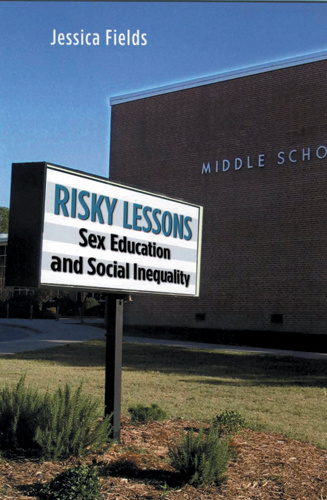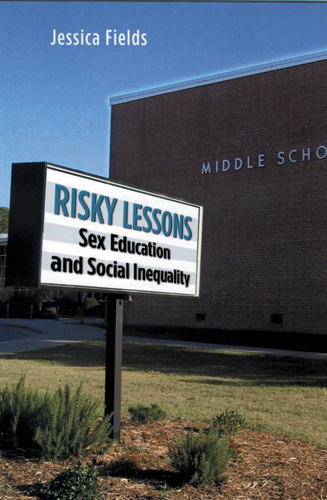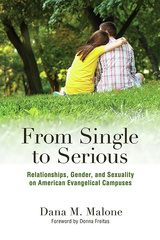Risky Lessons
Sex Education and Social Inequality
Rutgers University Press
Curricula in U.S. public schools are often the focus of heated debate, and few subjects spark more controversy than sex education. While conservatives argue that sexual abstinence should be the only message, liberals counter that an approach that provides comprehensive instruction and helps young people avoid sexually transmitted diseases and pregnancy is necessary. Caught in the middle are the students and teachers whose everyday experiences of sex education are seldom as clear-cut as either side of the debate suggests.
Risky Lessons brings readers inside three North Carolina middle schools to show how students and teachers support and subvert the official curriculum through their questions, choices, viewpoints, and reactions. Most important, the book highlights how sex education's formal and informal lessons reflect and reinforce gender, race, and class inequalities.
Ultimately critical of both conservative and liberal approaches, Fields argues for curricula that promote social and sexual justice. Sex education's aim need not be limited to reducing the risk of adolescent pregnancies, disease, and sexual activity. Rather, its lessons should help young people to recognize and contend with sexual desires, power, and inequalities.
Risky Lessons brings readers inside three North Carolina middle schools to show how students and teachers support and subvert the official curriculum through their questions, choices, viewpoints, and reactions. Most important, the book highlights how sex education's formal and informal lessons reflect and reinforce gender, race, and class inequalities.
Ultimately critical of both conservative and liberal approaches, Fields argues for curricula that promote social and sexual justice. Sex education's aim need not be limited to reducing the risk of adolescent pregnancies, disease, and sexual activity. Rather, its lessons should help young people to recognize and contend with sexual desires, power, and inequalities.
Topical, important, interesting, and accessible, Fields's book will appeal to a wide audience of sociologists and educators.
In an elegant, candid, and rich qualitative study set in three North Carolina schools, Fields argues that the denial of young people's sexualities is at the heart of school based sex education. Utilizing a feminist analysis, the author deftly describes the constituencies, policies, issues, and people involved in the everyday controversies of sex education. Highly recommended.
An engaging feminist ethnography. Risky Lessons is the first to examine not only the debates, but also how sex education policy is translated into district-wide cuirricula and implemented (or not) in the classroom. Fields' unflinchingly critical, feminist perspective, combined with her determination to advocate for social and sexual justice in sex education, makes for a vividness and urgency that is utterly compelling. Everyone should read this brave book.
Intellectually thrilling, politically timely, theoretically strong and ethnographically elegant, Risky Lessons reveals the problematic effects of abstinence-only education and profound social inequalities, and the social dangers that mutate at their nasty intersection. At the same time, Fields demonstrates the power and urgency of teaching for desire, sexual subjectivity, safety and pleasure.
Smart, passionate and engaging, Risky Lessons throws open the classroom door to show the high stakes for teachers and students in our political battles over sex education. It should be required reading for every U.S. politician.
Jessica Fields casts a critical lens on the contentious national debates surrounding the content and form sex education should have in public schools. Risky Lessons is one of those few books whose values lies in the possibility of genuine change in policy and practice.
Risky Lessons is a must-read for feminist educators who are committed to challenging systems of oppression by transforming and 'politicizing' the formal and hidden curriculum of the classroom space. Fields provides concrete examples of how this classroom labor can and should be done in the face of immense opposition from policy and social movements that dictate abstinence-only education.
Topical, important, interesting, and accessible, Fields's book will appeal to a wide audience of sociologists and educators.
In an elegant, candid, and rich qualitative study set in three North Carolina schools, Fields argues that the denial of young people's sexualities is at the heart of school based sex education. Utilizing a feminist analysis, the author deftly describes the constituencies, policies, issues, and people involved in the everyday controversies of sex education. Highly recommended.
An engaging feminist ethnography. Risky Lessons is the first to examine not only the debates, but also how sex education policy is translated into district-wide cuirricula and implemented (or not) in the classroom. Fields' unflinchingly critical, feminist perspective, combined with her determination to advocate for social and sexual justice in sex education, makes for a vividness and urgency that is utterly compelling. Everyone should read this brave book.
Intellectually thrilling, politically timely, theoretically strong and ethnographically elegant, Risky Lessons reveals the problematic effects of abstinence-only education and profound social inequalities, and the social dangers that mutate at their nasty intersection. At the same time, Fields demonstrates the power and urgency of teaching for desire, sexual subjectivity, safety and pleasure.
Smart, passionate and engaging, Risky Lessons throws open the classroom door to show the high stakes for teachers and students in our political battles over sex education. It should be required reading for every U.S. politician.
Jessica Fields casts a critical lens on the contentious national debates surrounding the content and form sex education should have in public schools. Risky Lessons is one of those few books whose values lies in the possibility of genuine change in policy and practice.
Risky Lessons is a must-read for feminist educators who are committed to challenging systems of oppression by transforming and 'politicizing' the formal and hidden curriculum of the classroom space. Fields provides concrete examples of how this classroom labor can and should be done in the face of immense opposition from policy and social movements that dictate abstinence-only education.
Jessica Fields is an assistant professor of sociology at San Francisco State University.
Introduction: Asking more of sex education
Differences and divisions: Social inequality in sex education debates and policies
The prophylactic of talk: Sex educations's competing lessons on sexual communication
Natural and ideological: Depicting bodies in sex education
Embattled knowledge: Curiosity and understanding in sex education
Conclusion: Policy, practice, and sexuality education
Differences and divisions: Social inequality in sex education debates and policies
The prophylactic of talk: Sex educations's competing lessons on sexual communication
Natural and ideological: Depicting bodies in sex education
Embattled knowledge: Curiosity and understanding in sex education
Conclusion: Policy, practice, and sexuality education






